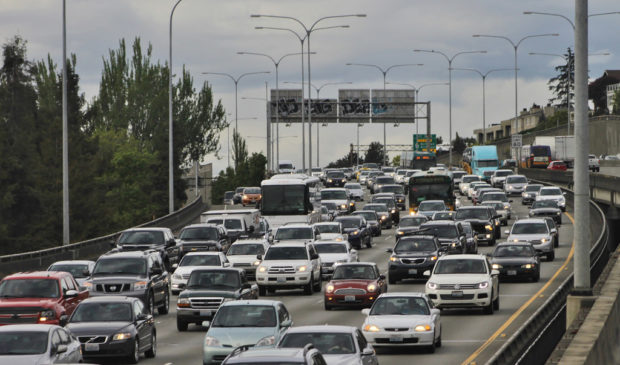At Capital Metro’s Traffic Jam, Adler brings the noise
Thursday, July 27, 2017 by
Caleb Pritchard Mayor Steve Adler’s plan for the next big transportation funding package is a new way forward indeed.
On Wednesday night, at a large public engagement event meant to highlight the Capital Metropolitan Transportation Authority’s ongoing Project Connect process, Adler suggested that the plan would dwarf the historic $720 million package that voters approved last year.
“We’re never going to do what we need to do on transportation until the state recognizes that it is important for the state to put its shoulder to this as well and to help regions do this,” Adler told the crowd of more than a hundred gathered at Capital Metro’s second Traffic Jam. “It’s not going to happen until we collectively recognize that we have to work regionally in order to be able to get this done.”
Adler pointed to Seattle and Phoenix, two cities of comparable size and economic trajectory as Austin, and cited their recent successful transportation referendums that were each worth tens of billions of dollars. The mayor laid out a general strategy he believes Austin could follow to achieve similar results.
First, he said, regional partners must cooperate and put together in 2018 a comprehensive plan for investments. Then, Austin and other urban regions across the state must lobby the Texas Legislature in 2019 to allow more funding options, such as a higher sales tax ceiling. Finally, Adler said, voters could then vote on the comprehensive plan in a 2020 referendum.
The first step is currently underway with Project Connect, the long-term planning process that will produce recommendations for new high-capacity transit investments to move residents into, out of and around Austin’s urban core. Wednesday night’s Traffic Jam served as the official kick-off of the effort’s second phase, which will analyze a range of transit modes along potential investment corridors identified in the first phase. The entirety of Project Connect is expected to wrap up in the fall of 2018.
As for the third step, Adler made a convincing case that a wave of voters eager to oust President Donald Trump will bolster a transit referendum in 2020.
The second step though could prove to be the plan’s Achilles’ heel. The 85th Texas Legislature is currently in a special session with marching orders from Gov. Greg Abbott to find a way to make tax hikes even harder for cities and other jurisdictions. The call also features several other items that are considered by many to be hostile to cities in general, and Austin in particular.
Adler suggested to the Austin Monitor after the event that the plan hinges on a shift in the makeup of the heavily conservative legislature in next year’s elections.
“My sense is that a lot of the stuff that’s happening at the legislature right now is being directed at Republican primary voters. I don’t know that it resonates with general election Republicans, much less general election Democrats,” said Adler. “I just think that there’s going to be pushback across party lines.”
The mayor’s ambitious plan doesn’t just face headwinds on the state level though. On Wednesday night, Steven Knapp of the political action committee Our Rail, a group that has advocated for a light rail route down the Guadalupe-Lamar corridor, commended Adler for his “bold leadership” in envisioning the plan. However, Knapp urged a quicker, less convoluted path.
“We should not wait, and hope, on a state legislature change in 2019 which would allow this Seattle-sized vote in 2020. In 2017, we should be focusing also on how to self-fund our own spine and start on transit now,” Knapp said.
He cited the panel of transit experts Capital Metro had put up at the Traffic Jam before the mayor’s remarks. Each hailed from a city that had already made high-capacity transit investments. Knapp pointed out that the representative from Dallas Area Rapid Transit said his agency originally used only local money to fund its first light rail lines.
Funding mechanisms currently available to the city, such as tax increment financing, could be used in addition to property tax bonds to pay for a starter segment in Austin, Knapp offered, and voters should decide on that referendum next year.
Photo by SounderBruce made available through a Creative Commons license.
The Austin Monitor’s work is made possible by donations from the community. Though our reporting covers donors from time to time, we are careful to keep business and editorial efforts separate while maintaining transparency. A complete list of donors is available here, and our code of ethics is explained here.
You're a community leader
And we’re honored you look to us for serious, in-depth news. You know a strong community needs local and dedicated watchdog reporting. We’re here for you and that won’t change. Now will you take the powerful next step and support our nonprofit news organization?









